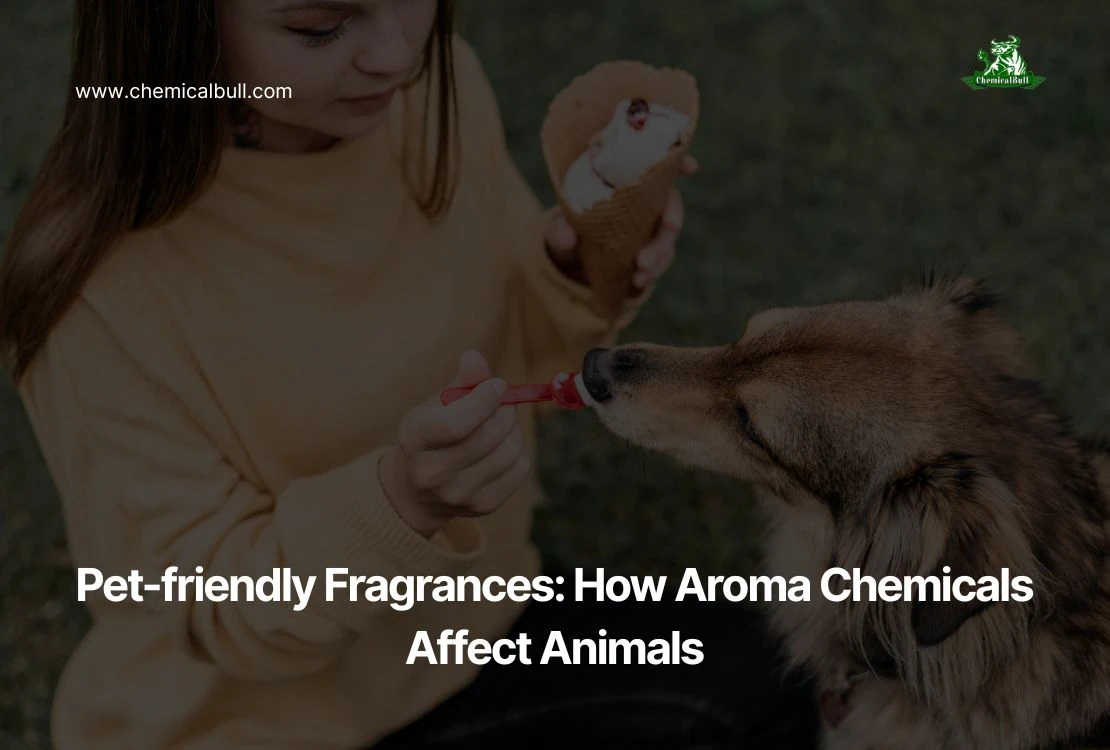Pet-friendly Fragrances: How Aroma Chemicals Affect Animals
Fragrances are everywhere—candles, perfumes, air fresheners, cleaning products, and even personal care items. While these scents add ambiance and personal flair to our surroundings, they may pose hidden dangers to our four-legged family members. Animals, particularly dogs and cats, are susceptible to scent molecules and chemicals in ways that humans are not.
Understanding how aroma chemicals affect animals is essential for creating a safe environment at home. In this blog, we'll explore the impact of fragrance on pets, common ingredients to watch out for, and how to maintain a beautifully scented home that's safe for your furry companions.
Why Are Pets Sensitive to Fragrances?
Unlike humans, pets have a significantly heightened sense of smell. For example, a dog's sense of smell is anywhere from 10,000 to 100,000 times more sensitive than a human's. This means that a scent you may find subtle or even pleasant can be overwhelming or even toxic to your pet.
Cats, although less sensitive than dogs in terms of olfactory power, have unique metabolic pathways that make it difficult for them to process certain chemicals. This includes many essential oils and synthetic fragrance compounds commonly used in perfumes and diffusers.
Additionally, animals groom themselves by licking, meaning they may ingest anything that's been absorbed into their fur, including airborne fragrance particles.
Common Aroma Chemicals That Can Harm Pets
Fragrance formulations are often proprietary, and "fragrance" on a label could mean a mix of dozens or even hundreds of chemicals. Here are some common aroma ingredients that can be harmful to pets:
1. Essential Oils
Although natural, many essential oils are toxic to animals. These include:
- Tea tree oil: Highly toxic to cats and dogs, even in small amounts.
- Eucalyptus oil: Can cause drooling, vomiting, weakness, and tremors.
- Cinnamon oil is known to cause irritation and allergic reactions.
- Citrus oils (lemon, orange, bergamot): Toxic to cats and can cause liver issues.
- Peppermint and wintergreen oils: Can cause respiratory problems in pets.
2. Phthalates
Phthalates are used to make fragrances last longer, but they are also endocrine disruptors. They can interfere with hormone regulation in both humans and animals. For pets, long-term exposure to phthalates has been linked to kidney and liver damage.
3. Benzene Derivatives
Found in many synthetic perfumes, benzene derivatives are harmful to pets' respiratory systems and may even be carcinogenic over time.
4. Limonene and Linalool
These compounds are found in citrus-scented products and are toxic to cats. They can cause vomiting, diarrhea, and liver damage.
5. Alcohol-Based Sprays
Many body sprays and room fresheners use high concentrations of alcohol, which can irritate the skin and lungs when inhaled by pets and can be dangerous if ingested.
Symptoms of Fragrance Poisoning in Pets
It's essential to watch for symptoms of chemical sensitivity or poisoning in your pets, especially after introducing a new scented product. Signs may include:
- Sneezing or coughing
- Watery eyes or nose
- Excessive scratching or grooming
- Lethargy
- Vomiting or diarrhea
- Difficulty breathing
- Muscle tremors (in severe cases)
If your pet shows any of these signs after exposure to a new fragrance or cleaning product, remove the product immediately and contact your veterinarian.
Creating a Pet-Safe Fragrance Environment
Just because some fragrances are harmful doesn't mean you have to give up a pleasant-smelling home. Here are ways to enjoy scents while keeping your pets safe:
1. Choose Pet-Friendly Products
Look for products specifically labeled as "pet-safe" or "non-toxic for animals." These are typically formulated without harmful essential oils or synthetic compounds.
2. Ventilation Is Key
Always ensure good airflow when using any scented product. Open windows or use exhaust fans to disperse scent particles and reduce concentration in the air.
3. Use Diffusers With Caution
If you use essential oil diffusers, place them in rooms your pets do not access. Even passive inhalation can affect their health. Never allow oils to contact their skin or fur.
4. Try Natural Alternatives
- Baking soda: Great for neutralizing odors without chemicals.
- Activated charcoal: Absorbs smells from the air.
- Pet-safe fresh herbs: Lavender, rosemary, and thyme (in moderation) can be pleasant and safe for most pets when used fresh in bowls or satchels.
5. Limit Direct Application Products
Never apply perfumes, body sprays, or essential oils directly onto your pets, even if the product claims to be natural. Their skin can absorb chemicals, and they're likely to ingest it while grooming.
Pet-Friendly Fragrance Brands to Consider
Some companies now offer fragrances and cleaning products that are safe for pets. Here are a few to explore:
- Attitude Living: Offers pet-safe air purifiers and cleaning products.
- Grow Fragrance: Plant-based and toxin-free air fresheners.
- Zum Mist: Made from essential oils, but avoids using strong variants around cats.
- Pet House by One Fur All: Specializes in candles, sprays, and wax melts formulated to be safe for pets.
Always research ingredients and read reviews, even from pet-safe labeled products, to ensure they're right for your specific animal species.
Conclusion
Fragrance adds a sensory layer to our homes and routines, but when pets are part of the family, it's crucial to think beyond the pleasant scent. Aroma chemicals both natural and synthetic can negatively affect your pet's health, primarily when inhaled, absorbed through the skin, or ingested during grooming.
By understanding which ingredients to avoid and opting for pet-friendly alternatives, you can maintain a beautifully aromatic space without compromising your furry friend's well-being. A little knowledge goes a long way in creating a home that smells wonderful and keeps every member of the family human and animal a like safe and happy.

Pharmaceutical Grade Vs Industrial Grade Chemicals: Understanding The Essential Differences
14-Feb-2026

Sustainable Api Production: Green Chemistry, Continuous Flow Manufacturing And Strategic Sourcing
12-Feb-2026





